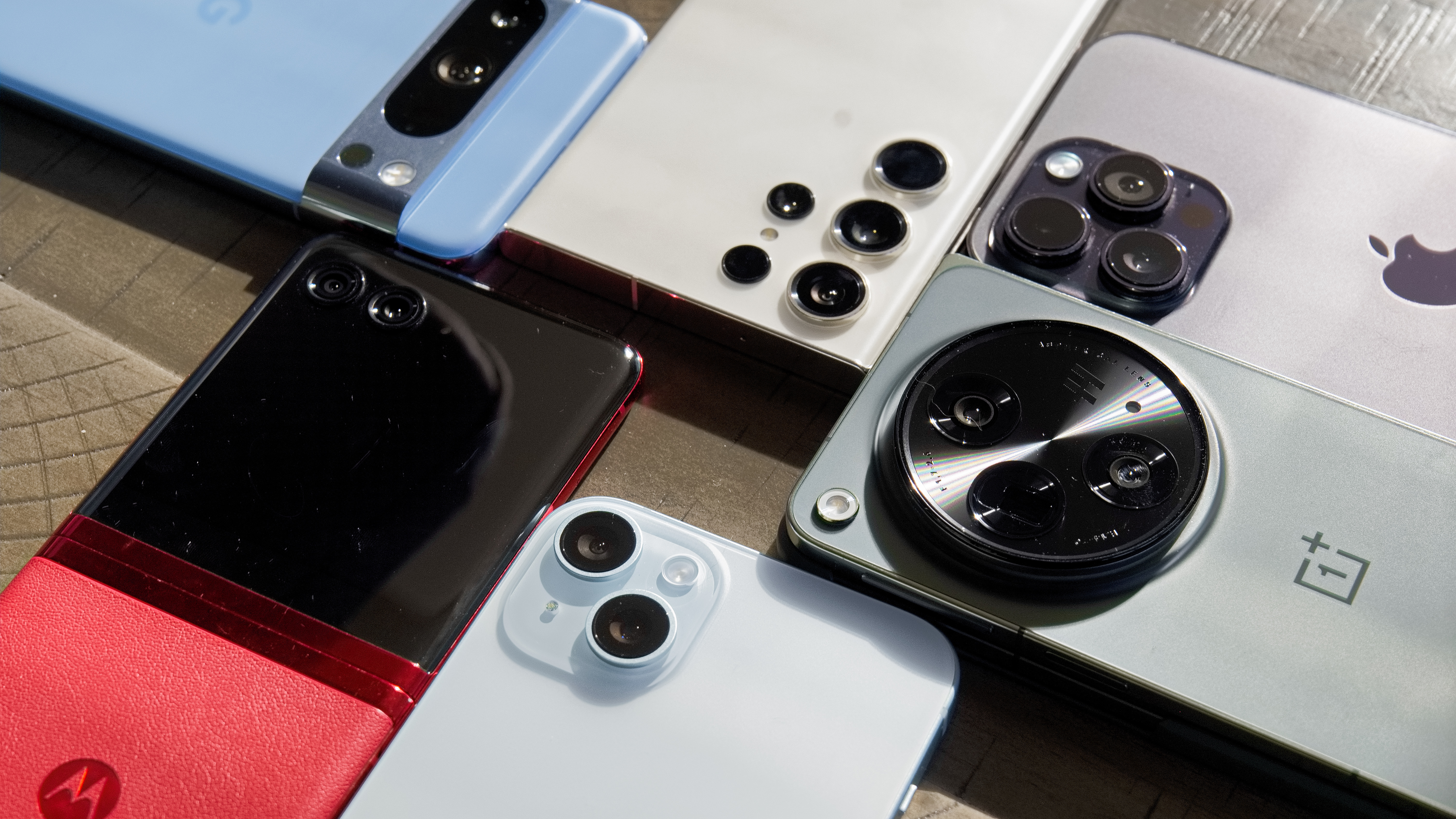What's the fastest phone of 2023? Our test results are in
It's time for the phones of the year to go head-to-head

Here at Tom’s Guide our expert editors are committed to bringing you the best news, reviews and guides to help you stay informed and ahead of the curve!
You are now subscribed
Your newsletter sign-up was successful
Want to add more newsletters?

Daily (Mon-Sun)
Tom's Guide Daily
Sign up to get the latest updates on all of your favorite content! From cutting-edge tech news and the hottest streaming buzz to unbeatable deals on the best products and in-depth reviews, we’ve got you covered.

Weekly on Thursday
Tom's AI Guide
Be AI savvy with your weekly newsletter summing up all the biggest AI news you need to know. Plus, analysis from our AI editor and tips on how to use the latest AI tools!

Weekly on Friday
Tom's iGuide
Unlock the vast world of Apple news straight to your inbox. With coverage on everything from exciting product launches to essential software updates, this is your go-to source for the latest updates on all the best Apple content.

Weekly on Monday
Tom's Streaming Guide
Our weekly newsletter is expertly crafted to immerse you in the world of streaming. Stay updated on the latest releases and our top recommendations across your favorite streaming platforms.
Join the club
Get full access to premium articles, exclusive features and a growing list of member rewards.
The power of a smartphone is not easily quantified, at least not in the eyes of the general public. Developers will throw out buzzwords and chipsets to sell their phones, without ever really explaining what they mean in hopes of claiming the coveted title of the fastest phone. However, we aim to make it much simpler to know which smartphone is more powerful than the other.
Whenever we review a smartphone, we put it through a diverse battery of tests. Regarding power, we use benchmark testing to find the limits of the CPU, GPU and general processing abilities. This allows us to easily quantify the power of a phone and demonstrate how much processing power it can draw from its components.
After going through our testing database this year we looked up the best phones of the year and then selected the top performers from each chipset. Let’s get introductions out of the way before the grand showdown begins.
The most powerful phones of 2023
| Header Cell - Column 0 | Chipset | RAM |
|---|---|---|
| iPhone 15 Pro | A17 Pro | 8GB |
| iPhone 15 | A16 Bionic | 6GB |
| Samsung Galaxy S23 Ultra | Snapdragon 8 Gen 2 Samsung | 12GB |
| Asus ROG Phone 7 Ultimate | Snapdragon 8 Gen 2 | 16GB |
We have four phones on the contender list, each representing the best score for their specific chipset, although we have separated the Snapdragon 8 gen 2 chips between Samsung and non-Samsung phones. These phones are the iPhone 15 Pro, iPhone 15, Samsung Galaxy S23 Ultra and Asus ROG Phone 7 Ultimate.
The iPhone is one of the more recognizable brands on the market, but that is not the reason there are two on the list. Having been the case for the last few years, the Pro models come with a more advanced chip than the base model. In this case, the iPhone 15 has an A16 Bionic chip, while the iPhone 15 Pro and iPhone 15 Pro Max have an A17 Pro chip.
The Samsung Galaxy S23 Ultra is the first of our phones to run the Snapdragon 8 Gen 2 chip, which is currently the most used chip in Android models. Due to the number of phones that ran the Snapdragon chip, we have decided to separate the Samsung phones from the other models. Currently, the top-performing non-Samsung phone is the Asus ROG Phone 7 Ultimate.
So, with our contenders selected it is time to put them through three different tests to see how they do, place your bets and maybe your favorite will be the winner.
Get instant access to breaking news, the hottest reviews, great deals and helpful tips.
The Geekbench Test
| Header Cell - Column 0 | Single-Core Score | Multi-Core Score |
|---|---|---|
| iPhone 15 Pro | 2890 | 7194 |
| iPhone 15 | 2518 | 6179 |
| Samsung Galaxy S23 Ultra | 2091 | 5511 |
| Asus ROG Phone 7 Ultimate | 2054 | 5692 |
The Geekbench 6 benchmark tests a phone's CPU by running a program through the phone. We make sure to run this test three times to get the average result, and it remains one of the best options for comparing overall computing power.
Overall the iPhone 15 Pro and the iPhone 15 had the highest performance across the bar with both the single-core and multi-core tests far exceeding the Snapdragon’s performance. Surprisingly, the A15 chip managed to even beat the iPhone 14 Pro which ran the same A16 Bionic chip. Interestingly it seems that Apple has managed to improve their multi-core function as well, something they struggled with in last year's test.
Meanwhile, the Snapdragon 8 Gen 2 chips managed a more uniform ranking. The Samsung Galaxy S23 Ultra managed to outperform the others in the Single-core numbers, but it was outperformed by the Asus ROG Phone 7 Ultimate in the multi-core test. Although the numbers weren’t drastically different, which indicates each of the phones appears to getting better at working with the chip and implementing it more efficiently.
Wild Life Unlimited (FPS)
| Row 0 - Cell 0 | Wild Life Unlimited (FPS) |
| iPhone 15 Pro | 94.3 |
| iPhone 15 | 72.1 |
| Samsung Galaxy S23 Ultra | 87.5 |
| Asus ROG Phone 7 Ultimate | 84.1 |
This GPU test essentially pushes the graphical capabilities of the phones by testing the GPU. The GPU (graphics processing unit) is essentially the means for the phone to control the users' gaming experience, so its method of rendering detailed scenes smoothly is imperative.
Interestingly, it appears that this test has seen the iPhone 15 drop from the top running with the base model scoring the lowest number from our finalists. However, Apple also claimed the top spot with the iPhone 15 Pro. In truth, Apple has not historically focused on the gaming aspect of their phones so it is interesting to see them claim both the top and bottom spot.
The next higher-scoring phone was the S23 Ultra which was surprising considering the Asus ROG Phone 7 has sold itself as a gaming phone. However, it should be noted that there is more to the running games than the FPS (frames per second), so if you are looking for a gaming phone, then it is by no means a poor option.
Adobe Premier Rush
| Header Cell - Column 0 | Time to transcode (mins:secs) |
|---|---|
| iPhone 15 Pro | 00:26 |
| iPhone 15 | 00:25 |
| Samsung Galaxy S23 Ultra | 00:39 |
| Asus ROG Phone 7 Ultimate | N/A |
This final test is one of our own designs, but one we feel is a great example of the power and speed of our top contenders. In this test we time how long it will take our phones to transcode a 4K video into a 1080p one using Adobe Premier Rush. We also add in a color filter and a fade-in transition for a bit of extra challenge.
Once again Apple has taken the lead in this test, although that isn’t all that surprising. Apple is well known for its editing abilities and its line of Macbooks are often used for this purpose, so it would make sense for the phones to outperform the others.
Sadly the S23 Ultra came in last with this test, while the Asus ROG Phone 7 had a crashing issue and was unable to complete the test. It appears that the Snapdragon chip has some issues in this area as we saw the iPhone win in last year's test as well.
Fastest phones in 2023: verdict
As for the overall results, it appears that the iPhone has once again won pretty handily, although the age of the A16 chip shone through in one instance. However, it is interesting to see that even the older iPhone chip was able to outperform the newer Snapdragon 8 Gen 2 in terms of speed.
It seems Android will need to work to improve their performance in 2024, especially with the release of the Snapdragon 8 Gen 3 already underway. Only time will tell if next year's contest will be closer, or if the gap will widen even further.
More from Tom's Guide
- Samsung Galaxy S24 mega leak just spilled the specs for all three models — here’s what you get
- OnePlus confirms its OnePlus 12R launch plans — and they include the U.S.
- This nasty Android banking trojan can steal your PIN by disabling fingerprint unlock — how to stay safe

Josh is a staff writer for Tom's Guide and is based in the UK. He has worked for several publications but now works primarily on mobile phones. Outside of phones, he has a passion for video games, novels, and Warhammer.
 Club Benefits
Club Benefits










